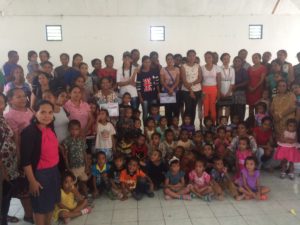International Women’s Day is a global day celebrating the social, economic, cultural and political achievements of women. This year’s theme is ‘Be Bold for Change’. With this in mind, MMI would like you to get to know Maria Pereira, who, through the empowerment of education, has boldly made positive transformations in both her own and her children’s lives.
The following edited article is written by Anna Cranney, who recently worked with MMI staff in Dili to develop the workshop sessions and training manual for MMI’s Parents Program. This story highlights both Maria’s achievements and the powerful impact that MMI’s Parents Training program has on individuals, families and entire communities:

Deep in the hills of the Timor-Leste’s South coast, Maria Pereira is preparing for today’s class. But Maria is not your typical Timorese student: at 35 years of age, this will be her first experience of a classroom. Maria is soon joined by a group of 74 neighbours, all of whom are foregoing a day’s work in nearby fields, to attend this training. Most of them share a similar story to Maria; they have had no experience of primary school education or training before today.
Maria and her neighbours are attending a 10-week Parent Education Program delivered by Timorese trainers from Mary MacKillop International (MMI). MMI’s training aims to better engage parents in the early years of their child’s education. There are multiple imperatives for implementing a parental engagement program in rural Timor-Leste. During decades of conflict, many Timorese experienced disrupted schooling. Today, Timorese parents valiantly live with the impacts of their own disrupted schooling in their everyday lives. In 2010, the United Nations Development Program estimated that 58% of the adult population had basic literacy skills (UN Human Development report, 2010). It is estimated that literacy rates in rural and remote sub-districts, such as Maria’s village, are significantly lower. For Timorese parents who grew up during the Indonesian occupation, education for their own children is now their highest priority. However, their literacy skills impact on their ability to be active in many parts of their child’s education.
Further complicating this situation, is Timor-Leste’s rugged terrain where schools can be long distances from homes and can be inaccessible during ‘tempu udan’, or the wet season. Additionally, a lack of adequately trained early childhood professionals in many remote areas means that preschool education cannot be consistently delivered in some sub-districts. MMI’s program aims to address some of these barriers by training parents to understand basic elements of early childhood education and to practice them with their children at home.
By the end of MMI’s program, Maria was able to understand what preschool and primary school education is, why it is important, and to visit a classroom and meet teachers at the local school. Maria learnt about simple counting and alphabet games, how to use visual literacy to read simple books with her children, understanding child protection laws and different strategies for behaviour management at home. Throughout the training, she also practiced creating learning resources and games from free materials found around her home, such as rocks and plastic bottles. On the final day of the 10 week training, all parents showcased the skills they learnt to their children.
Maria’s own feedback at the end of her training highlighted the confidence and practical knowledge she gained:
“Most of the parents in our rural area have no basic education so through this program we can understand and learn some basic knowledge about how to treat our children and teach them after and before school. I am happy because I can learn how to read, write, sing school songs, count numbers, do art and craft. Then, after the training, I go and teach those lessons to my children at home.”
Anna Cranney has worked on a number of education and training projects in Timor-Leste over the past seven years. She is passionate about the provision of quality training in regional and remote communities in Timor-Leste and Australia.
References:
United Nations Development Program, Human Development Report 2010, website: http://www.tl.undp.org/content/timor_leste/en/home/countryinfo.html

If you’d like to take bold action this International Women’s Day and support MMI’s Parents Training Program – click here.







